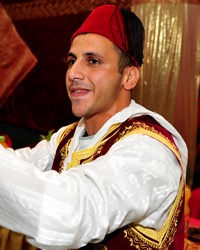Jewish, Judeo-Moroccan in United States

Photo Source:
Copyrighted © 2026
ChameleonsEye - Shutterstock All rights reserved. Used with permission |
Send Joshua Project a map of this people group.
|
| People Name: | Jewish, Judeo-Moroccan |
| Country: | United States |
| 10/40 Window: | No |
| Population: | 2,100 |
| World Population: | 69,600 |
| Primary Language: | Arabic, Judeo-Moroccan |
| Primary Religion: | Ethnic Religions |
| Christian Adherents: | 0.00 % |
| Evangelicals: | 0.00 % |
| Scripture: | Unspecified |
| Ministry Resources: | No |
| Jesus Film: | No |
| Audio Recordings: | Yes |
| People Cluster: | Jewish |
| Affinity Bloc: | Jewish |
| Progress Level: |
|
Introduction / History
The word Sephard was the name used by Jews in medieval times for the Iberian Peninsula. Sephardim Jews, then, are the descendants of the Jews who lived in Spain or Portugal prior to expulsion in 1492 by King Ferdinand and Queen Isabella. Sephardim also have a distinctive language called Ladino, or Judeo-Spanish. This is a dialect of Castilian Spanish with Hebrew and Turkish elements. Many of the Jewish people who were expelled from the Iberian Peninsula in 1492 went south to Morocco where they intermingled with the Berber peoples. They lived in their own Jewish quarters. Jews were dhimmis, meaning a religious minority that paid special taxes. The Muslim sultan protected them; he viewed an attack on religious minorities as an attack on his power. Jewish people in Muslim Morocco fared better there than they did in "Christian" Europe. Those who speak their language, Judean-Moroccan Arabic, usually live in Israel. There are smaller communities in Morocco, Canada and the United States. Those in the U.S. usually live in Los Angeles, New York or Miami.
The Moroccan Jewish people have been in the U.S. since the early 20th century, but more of them arrived in the 1970s and 1980s.
What Are Their Lives Like?
Instead of speaking Hebrew or Ladino, they speak Judeo-Moroccan Arabic. This is a variation of the Arabic spoken in Morocco. Those in North America are usually proficient in English though they speak Judeo-Moroccan Arabic among themselves.
Though they are small in number, they have their own synagogues such as the Moroccan Jewish Synagogue in Miami. The Moroccan Jewish community in America has maintained good connections with Sephardic Jewish people all over the world. In 2019 the New York State Senate declared May as Moroccan Jewish Heritage Month.
The Moroccan Jewish community has contributed to American society through the arts, media and the film industry.
What Are Their Beliefs?
For religious Jews, God is the Supreme Being, the Creator of the universe, and the ultimate judge of human affairs. Beyond this, the religious beliefs of the Jewish communities vary greatly. Orthodox Jews generally follow the traditional religious beliefs and practices found in the Jewish literature that interprets Scripture regarding ethical, religious, civil, and criminal matters. Reform Jews do not believe that God reveals the Jewish Law. They are not restricted to kosher foods. They neither wear the skullcap (yarmulke) when praying nor use Hebrew in prayer. All religious Jews believe in the coming of a Messianic Age, but only the Orthodox Jews look for a personal Messiah. Many Jewish people keep cultural Judaism, but they have rejected the spiritual elements taught in the Old Testament. They might take part in cultural events and even religious ceremonies, but they are secular or New Age in their spiritual lives.
What Are Their Needs?
Jewish people have a wonderful understanding of their connection with the Abrahamic Covenant. However, they also have a history of rejecting Jesus Christ as Messiah, the one who has fulfilled that covenant. They tend to view Christianity as the religion of their oppressors rather than the fulfillment of what God promised all of humanity through Abraham centuries ago.
Prayer Points
Pray for the Lord to give Morocco Jewish people hearts that will want to please him. May they look to the Lord for guidance and truth, and not be satisfied with cultural traditions. Pray for Jewish people in the U.S. to begin a movement to Jesus Christ, finding ways to exalt him while honoring their culture.